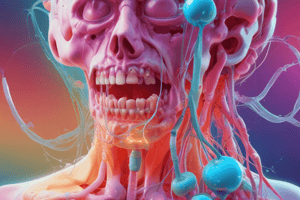Podcast
Questions and Answers
Which of the following is NOT a function of water in the human body?
Which of the following is NOT a function of water in the human body?
- Transporting nutrients to cells
- Maintaining normal body temperature
- Generating energy for muscle contraction (correct)
- Acting as a tissue lubricant
What percentage of the human body weight is primarily composed of water?
What percentage of the human body weight is primarily composed of water?
- 30% to 40%
- 50% to 60% (correct)
- 70% to 80%
- 40% to 50%
How does body fat content influence the percentage of total body water?
How does body fat content influence the percentage of total body water?
- More body fat correlates with a lower percentage of body water. (correct)
- More body fat leads to a higher percentage of body water.
- Body fat increases fluid retention in lean tissues.
- It has no influence on total body water percentage.
Which of the following substances does water act as a solvent for in the body?
Which of the following substances does water act as a solvent for in the body?
Which group tends to have a higher proportion of body fat, affecting their total body water percentage?
Which group tends to have a higher proportion of body fat, affecting their total body water percentage?
What characterizes isotonic solutions?
What characterizes isotonic solutions?
What happens to fluid in a hypotonic solution when exposed to another solution with higher solute concentration?
What happens to fluid in a hypotonic solution when exposed to another solution with higher solute concentration?
Which type of solution has a higher solute concentration than another solution?
Which type of solution has a higher solute concentration than another solution?
Which administration route allows for the direct infusion of fluids into the bloodstream?
Which administration route allows for the direct infusion of fluids into the bloodstream?
Which of the following IV solutions contains the highest potassium content?
Which of the following IV solutions contains the highest potassium content?
What physiological change is associated with aging in relation to body composition?
What physiological change is associated with aging in relation to body composition?
Which hormone is primarily involved in regulating water reabsorption in the kidneys?
Which hormone is primarily involved in regulating water reabsorption in the kidneys?
What triggers the release of renin in the kidney?
What triggers the release of renin in the kidney?
In the renin-angiotensin-aldosterone system (RAAS), what does angiotensin II cause?
In the renin-angiotensin-aldosterone system (RAAS), what does angiotensin II cause?
How do fluids and solutes primarily move within the body to maintain homeostasis?
How do fluids and solutes primarily move within the body to maintain homeostasis?
Which mechanism is NOT involved in water regulation in the body?
Which mechanism is NOT involved in water regulation in the body?
What is the primary function of aldosterone in relation to fluid balance?
What is the primary function of aldosterone in relation to fluid balance?
What effect do narcotics and anesthetic agents have on fluid balance in the body?
What effect do narcotics and anesthetic agents have on fluid balance in the body?
What is the primary cause of fluid volume excess (FVE)?
What is the primary cause of fluid volume excess (FVE)?
Which of the following is not a contributing factor to hypervolemia?
Which of the following is not a contributing factor to hypervolemia?
What is the primary purpose of administering diuretics in hypervolemia?
What is the primary purpose of administering diuretics in hypervolemia?
What condition is characterized by the loss of extracellular fluid (ECF) volume exceeding fluid intake?
What condition is characterized by the loss of extracellular fluid (ECF) volume exceeding fluid intake?
What percentage of filtered sodium is normally reabsorbed in the distal tubule by thiazide diuretics?
What percentage of filtered sodium is normally reabsorbed in the distal tubule by thiazide diuretics?
Which of the following accurately describes the difference between fluid volume deficit and dehydration?
Which of the following accurately describes the difference between fluid volume deficit and dehydration?
Which classification of diuretics is most effective for severe hypervolemia?
Which classification of diuretics is most effective for severe hypervolemia?
Which symptom would you expect to find in a patient with hypovolemia?
Which symptom would you expect to find in a patient with hypovolemia?
Which of the following options describes isotonic expansion of the extracellular fluid (ECF)?
Which of the following options describes isotonic expansion of the extracellular fluid (ECF)?
Which of the following is NOT a common cause of fluid volume deficit (FVD)?
Which of the following is NOT a common cause of fluid volume deficit (FVD)?
In which situation is the intravenous (IV) route preferred for fluid replacement?
In which situation is the intravenous (IV) route preferred for fluid replacement?
What might be a necessary intervention if oral fluid replacement is not tolerated?
What might be a necessary intervention if oral fluid replacement is not tolerated?
What change in hematocrit levels would you expect in a patient with hypovolemia?
What change in hematocrit levels would you expect in a patient with hypovolemia?
Which diuretic is commonly prescribed for mild to moderate hypervolemia?
Which diuretic is commonly prescribed for mild to moderate hypervolemia?
What type of fluid is frequently used to treat hypotensive patients with fluid volume deficit?
What type of fluid is frequently used to treat hypotensive patients with fluid volume deficit?
Which of the following electrolyte imbalances is associated with adrenal insufficiency?
Which of the following electrolyte imbalances is associated with adrenal insufficiency?
Flashcards are hidden until you start studying
Study Notes
Perioperative Care Topics
- Focus on issues related to perioperative, oxygenation, cellular aberration, fluids and electrolytes, and inflammatory and immunologic disturbances.
- Key areas covered include management of clients throughout different academic terms: Prelim (Perioperative, Fluids and Electrolytes, Shocks), Midterm (Immunologic and Inflammatory Disturbances, Cellular Aberration, Respiratory Oxygenation), and Finals (Cardiovascular and Hematologic Oxygenation, Legal and Ethical Standards).
Importance of Water in the Body
- Comprises 50% to 60% of body weight, playing a crucial role in nutrient transport and cellular metabolism.
- Serves as a solvent for electrolytes, assists in temperature regulation, digestion, and waste elimination.
- Acts as a lubricant for body tissues, vital for maintaining cellular functions.
Variations in Fluid Content
- Body fat impacts total body water: obese individuals and females generally have lower percentages of body water compared to body weight.
- Aging increases body fat, further decreasing fluid percentages in older adults.
Water Regulation
- Antidiuretic Hormone (ADH): released in response to increased osmolarity, promoting water reabsorption in kidneys to manage blood volume.
- Renin-Angiotensin-Aldosterone System (RAAS): activated by low serum sodium and blood volume, leading to sodium reabsorption and fluid retention.
Fluid Movements
- Body fluids and solutes shift continuously between compartments to maintain homeostasis.
- Fluid transport mechanisms include active transport, diffusion, osmosis, and filtration.
Types of Fluid Solutions
- Isotonic solutions (e.g., Normal Saline) maintain balance without net shifts.
- Hypotonic solutions have lower solute concentrations, causing fluid to shift into more concentrated solutions (e.g., 0.45% saline).
- Hypertonic solutions contain higher solute concentrations, drawing fluid from other solutions (e.g., D5 Normal Saline).
Fluid Replacement Therapy
- Routes of administration include oral, nasogastric, and intravenous.
- Oral fluids are preferred if the patient can tolerate; IV is used for acute or severe fluid loss.
Hypovolemia (Fluid Volume Deficit)
- Occurs when extracellular fluid loss exceeds intake, preserving solute ratio.
- Different from dehydration, which involves water loss with increased serum sodium levels.
Causes of Hypovolemia
- Factors include vomiting, diarrhea, sweating, decreased intake, and third-space fluid shifts.
- Other potential causes: diabetes insipidus, adrenal insufficiency, and hemorrhage.
Clinical Manifestations and Diagnostics
- Increased hematocrit levels due to decreased plasma volume.
- Electrolyte imbalances such as hypokalemia, hyperkalemia, hyponatremia, and hypernatremia observed during diagnostics.
Medical Management for Hypovolemia
- Oral rehydration preferred for non-severe cases; IV solutions for acute losses.
- Isotonic solutions expand plasma volume; antiemetics may be needed alongside fluid replacement.
Hypervolemia (Fluid Volume Excess)
- Results from isotonic ECF expansion due to water and sodium retention, leading to total body sodium increase.
- Contributing factors: heart failure, renal failure, cirrhosis, or excessive sodium consumption.
Management of Hypervolemia
- Diuretics prescribed when sodium restriction is inadequate; varies based on renal function and severity.
- Thiazide diuretics for mild to moderate conditions; loop diuretics like furosemide for severe cases, effectively reducing sodium and water retention.
Studying That Suits You
Use AI to generate personalized quizzes and flashcards to suit your learning preferences.




